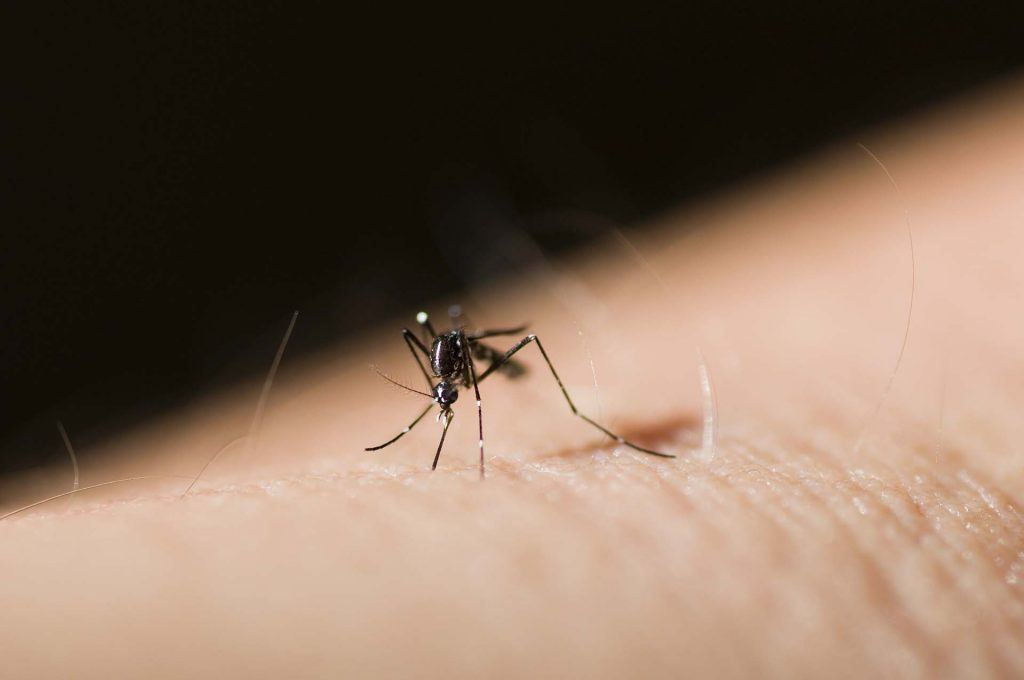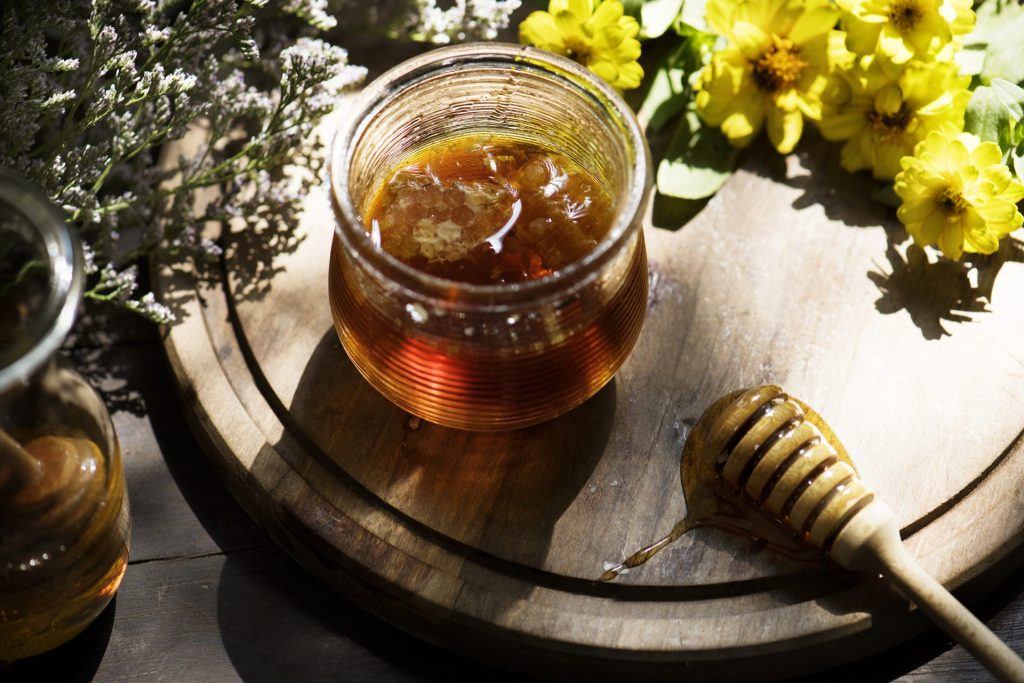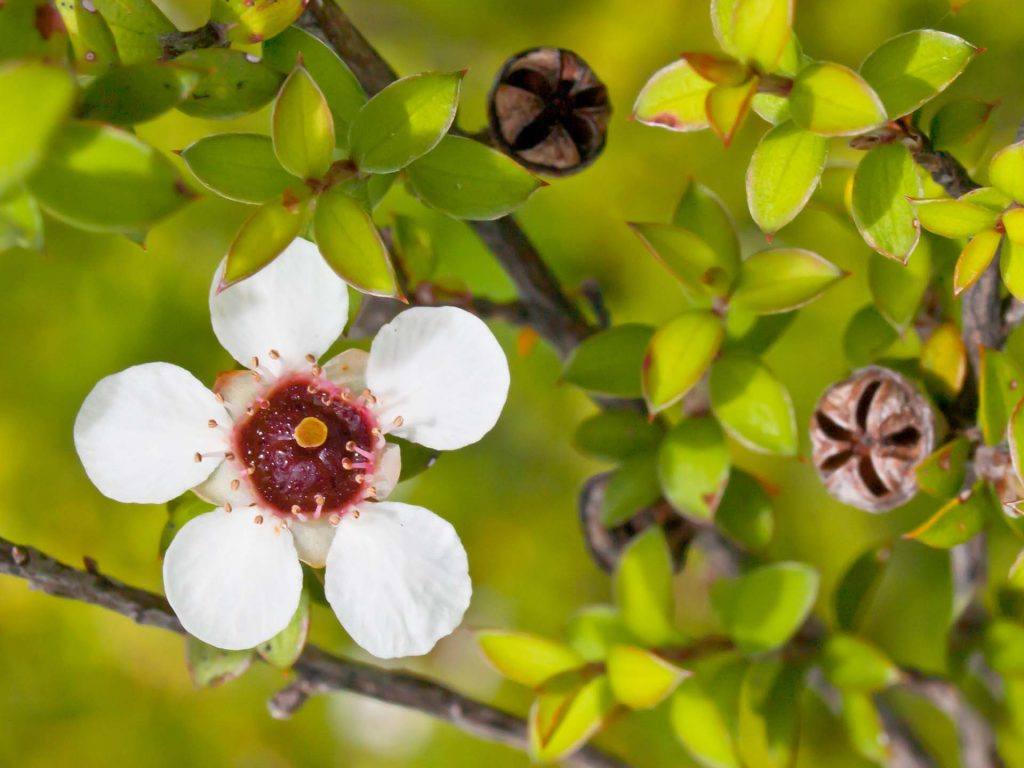Manuka has become a trendy word thrown about by celebrities, but what is the hype behind Manuka honey? And why are we talking about honey on an essential oil blog?
Fear not, we have all of the answers for you! While Manuka honey has many fantastic benefits, we will be focusing on the many benefits of Manuka essential oil.
We’ll go through what Manuka is so that you can impress all of your friends with your plant biology knowledge, then get into the benefits of Manuka oil as well as the best varieties for you. Finally, we’ll clear up some of the confusion surrounding Manuka so you can use this essential oil with confidence!
Table of Contents
What is Manuka?
To learn about Manuka, let’s take it back to its origins in New Zealand. The Manuka tree’s scientific name is Leptospermum scoparium, which, if you aren’t fluent in Greek and Latin, means ”slender seed” and “wool-bearing.” The reason being is that this unique plant has silky, hairy leaves and thin flower buds. Manuka flowers are very sweet-smelling and offer pollen and nectar for all kinds of local insects like bees, flies, and moths but also geckos enjoy the sweet nectar of the Manuka flower.
This scrub-type tree grows freely in coastal New Zealand, where land that was previously cleared either for forestry or farming is being left to become forests once more. Manuka is usually one of the first plants to grow back on cleared land like this.
Although we call this plant a “shrub,” it grows to be anywhere from 16 to 49 feet in height! Manuka is known as evergreen because of its dense branches and small leaves. Lastly, bees collect the nectar of this tree for what we know as Manuka honey came about much later than the use of the tree itself.
The Maori are the indigenous people of New Zealand and coincidentally some of the first people to put the fantastic benefits of Manuka honey to use. Way before the arrival of the explorer Captain Cook and the early settlers of New Zealand, the Maori were reaping the benefits of the Manuka tree.
Manuka Uses

In the early times, Manuka was used primarily for its hardy wood and bark and utilized for everything from paddles, weapons, spade blades, bird spears, and even house building. For home building, Manuka wood could be used for water containers and also as a waterproof layer for roofing!
Manuka was also well known by the Maori people for its incredible healing properties. An infusion using the bark of the Manuka tree was used externally and internally as a sedative and to soothe burns on the skin.
The Maori even used the ash from the bark to rub into the skin to treat skin problems. The leaves were used for colds by being boiled in water and letting the affected person inhale the vapors. The inner bark of the tree was boiled and used as a mouthwash as well. Manuka had an incredible usage before the benefits of its honey were discovered.
The Benefits of Manuka Oil
Manuka oil, much like its tea tree cousin, has a myriad of uses and benefits. From treating dry scalps to assisting with allergies, Manuka essential oil has you covered. Here are a few of the most common benefits of Manuka essential oil.
Manuka Inhibits Bacterial Growth
In today’s medical world, we are seeing that more and more physicians are routinely prescribing anti-antibiotics to combat bacterial growth. While antibiotics are sometimes necessary, researching effective alternative forms of bacteria inhibition is crucial as we look to the future. Manuka’s potential bacterial growth inhibition makes it very significant for the future of medicine.
Manuka essential oil, much like tea tree oil, has been shown to inhibit bacterial growth in the body that can potentially lead to infections in the colon, urinary tract, respiratory system, and other vulnerable areas of the body. One study showed that Manuka essential oil not only stopped bacterial growth but is also weakened the pre-existing concentration of bacteria. That’s some powerful stuff!
The Maori people had the right idea when they used the inner bark of the Manuka tree to create a mouthwash. A recent scientific study verified the ability of Manuka essential oil to kill harmful bacteria that live in the mouth. When the bacteria were exposed to concentrated Manuka essential oil for just 30 seconds, it was killed entirely. The indigenous people of New Zealand likely pioneered this natural treatment for oral bacteria.
Manuka Fights Dandruff

If you have tried everything for taking care of frustrating dandruff, Manuka essential oil might be your saving grace! Dandruff happens when the skin of the scalp lacks oil or moisture. The reasoning behind this varies, but some common reasons are that the surface of the scalp might be degenerating, or you might have a scalp skin infection. Manuka essential oil has been observed to be useful in helping with both problems!
Not only can Manuka essential oil prevent infections, but it can also restore moisture to your scalp and rebalance the oils in your scalp.
For an at-home dandruff remedy, add a few drops to your favorite carrier oil (we recommend coconut oil or jojoba oil because of their added benefits) and massage it into your scalp. You can also soak your head in a warm bath with a few drops of Manuka essential oil. Make sure to do a small patch test to ensure that you don’t experience any adverse effects from this essential oil.
In addition to proving that it can kill bacteria, Manuka essential oil has also shown virus-killing properties! Amazingly, scientific studies have shown that Manuka essential oil tested against Herpes simplex virus type 1 and 2 led to decreased concentrations of the virus in the host when pre-treated with Manuka essential oil.
The active ingredients in Manuka that made this possible are chemicals that occur naturally in the Manuka tree called beta-triketones. Leptospermone is the beta-triketone that gave Manuka its powerful punch against HSV-1 and HSV-2.
While this research is one small promising piece of the puzzle for Manuka, it is significant to note that the beta-triketones from Manuka essential oil produced such an effective result.
Manuka can be a Bite and Sting Antidote

t has been observed that Manuka essential oil can also be helpful if you end up with a bug bite, likely due to its anti-histaminic and anti-inflammatory properties. Some sources state that using a few drops of Manuka essential oil directly on the affected area will decrease inflammation and itching. Other sources recommend the use of Manuka honey as well. Scientific research is not clear on this, so proceed with caution. We do not recommend using Manuka essential oil without a carrier oil until you know how you interact with the oil.
Of course, if you have a bug bite that worsens or you know that you have anaphylactic reactions to bug bites, seek immediate medical attention.
Manuka can help scars fade and skin heal
Honey has been widely researched by scientists as a form of complementary medicine concerning wound healing and antimicrobial prevention in wounds.
One significant scientific study which tested the efficacy of several varieties of honey in accelerating cell regeneration, Manuka, was tested against Acacia and Buckwheat honey. While Manuka did not produce as significant of a result as Acacia and Buckwheat did, there was still evidence of Manuka’s wound-healing capabilities. Acacia and Buckwheat were particularly effective because they showed increases in fibroblasts in wounds after treatment. Fibroblasts are molecules that the body uses to assist with wound healing.
Another scientific study took a different approach to research wound healing using Manuka honey that was focused on methylglyoxal (MGO), which is a molecule found in abundance in Manuka honey that has proven antibacterial properties. In this study, wound dressings were coated with Manuka honey to see if this could be a potential natural option for preventing bacterial growth. The results were astounding, with the wound dressings that were treated with Manuka honey, showing that they inhibited bacterial growth in the wounds they covered. The scientists deemed this a potential natural option for wound healing that is also environmentally friendly.
To use Manuka essential oil for your skin healing needs, mix a few drops with a carrier oil like coconut oil, and apply directly to the affected area. As always, perform a small patch test first to make sure you don’t experience any adverse effects from this oil.
Manuka can be a relaxant

So not only does the fantastic Manuka tree produce all of the healing and preventative benefits we have explored thus far, but it also has uses in aromatherapy. This is another benefit of Manuka that has more empirical evidence than scientific backing. Still, it is known that scents that are woody or reminiscent of the outdoors can provide stress relief.
Manuka contains the terpene alpha-pinene, which has been identified as one of the terpenes in plants that contribute to relaxation. Terpenes are part of what makes plants smell the way they do and often produce benefits when distilled. Terpenes in cannabis are part of what gives the plant so many benefits and a distinctive scent as well.
One scientific study that may support the assertion that Manuka is a relaxant comes from a group of scientists who were studying the effects of Manuka on smooth muscle. There was a small relaxation in the smooth muscle when Manuka was utilized, but the mechanism of it is still not understood. So while we can observe Manuka’s aromatherapeutic benefits on ourselves, science has yet to give us definitive proof of its relaxant qualities.
You can always give it a try yourself by putting a few drops in your diffuser the next time you feel stressed!
Manuka can be used as a deodorant
Bacteria can be a leading cause of odor that may come from our bodies, and since we know that Manuka essential oil has bacteria-killing properties, it may help you out with your stinky pits. Some individuals choose to forgo deodorant for Manuka essential oil and claim that it is highly effective. Individuals will mix a few drops of Manuka essential oil with coconut oil and arrowroot powder to make their own all-natural deodorant and then apply it under their arms. It is a more natural option and has a lovely earthy fragrance, so give it a try and see how it works for you!
Manuka may help with allergies

While some non-scientific sources state that Manuka can help with allergic symptoms, significant research on this remains scarce. There is a chance that since Manuka essential oil has antimicrobial properties, it can also help with inflammation in the sinus, but the research is just not there.
The most important study I discovered about the use of Manuka essential oil for allergic rhinitis (aka stuffy nose and sneezing) stated that a Manuka-based nasal spray produced no effect on the study participants.
Proceed with caution while the research is scarce, as this is often how misinformation is spread. You can always try diffusing a few drops of Manuka essential oil during allergy season and see how it works for you!
Manuka can be anti-inflammatory
The anti-inflammatory benefits of Manuka are significant because they indicate a lot of different kinds of uses for this essential oil. In one scientific study that tested the use of Manuka oil internally, the results pointed toward Manuka reducing inflammation in the gut during testing. The study concluded that Manuka is a strong candidate for treating infections and other immune-related diseases. The mechanism that Manuka showed promise in was reducing the inflammatory effect of TNF-alpha, which is a cell-signaling protein (also known as a cytokine) that tells the body to produce inflammation. In responding to the TNF-alpha stimuli, Manuka showed promise as an anti-inflammatory.
Practical uses of Manuka as an anti-inflammatory include mixing a few drops with your carrier oil of choice and using it for skin irritation.
Manuka has anti-fungal benefits
In the same study that revealed the anti-inflammatory benefits of Manuka, anti-fungal benefits were also researched. When tested against candida, a fungus that commonly occurs in the human body, fungal growth was inhibited by Manuka oil.
Candida is a fungus in the human body that usually is okay, but can sometimes get out of control and cause problems throughout the body. Candida occurs plentifully in the mouth, but overgrowth can lead to bad breath and other more serious medical conditions. Candida in the rest of the body can result in inflammation and other health problems. Manuka’s effect on candida is significant for potential future use in medicine.
One practical use of Manuka essential oil as an anti-fungal is to mix a few drops with your favorite carrier oil and use it to treat Athlete’s Foot or toe fungus by applying it directly to the affected area. To learn more about this condition, check out our detailed article on which essential oils help most with Athletes Foot.
Recommended Manuka Essential Oils
Now that you’ve heard all of the fantastic things that Manuka can do let’s chat about what to look for when selecting a Manuka essential oil.
You want first to ensure that the product you are purchasing is 100% Manuka essential oil. Some less desirable brands will attempt to dilute or mix Manuka with other things. This can negatively impact the benefits you receive from Manuka essential oil.
Manuka originated in New Zealand, and to this day, Manuka essential oil that is produced 100% from the Manuka trees in New Zealand is considered to be of the highest quality.
We’ve learned so much about Manuka essential oil, but there is so much that this amazing plant can do for us! Here are a few topics that often come up when we talk about Manuka and its benefits.
What is UMF?
You have probably heard or seen UMF thrown around in conjunction with Manuka. UMF stands for Unique Manuka Factor and is a quality mark that helps consumers identify authentic Manuka honey. Not all Manuka strains have unique benefits, so this system helps us make sure that we are receiving top-quality Manuka. It also guarantees that the three most essential ingredients in Manuka honey, leptosperin, methylglyoxal, and DHA are all present in what you are purchasing this essential oil.
Associated with UMF is a grading scale ranging from 5 to 16+ and is often referred to as the “UMF factor.” Low grade is considered UMF5-9, a medium grade is considered UMF10-15, and Superior high grade is considered UMF16+. The next time you consider purchasing Manuka honey, be aware of the UMF factor of the label. Some benefits of this honey can only be noted at UMF16+. The UMF label is also an indicator that the Manuka honey is authentic and was made entirely and packaged in New Zealand. This assures that the quality of the product that you are receiving is guaranteed. New Zealand requires that all Manuka honey that bears the UMF label undergoes rigorous testing and quality assurance processes so that you can trust the UMF label.
Manuka Oil vs. Manuka Honey

When you saw this article, you probably thought we were going to chat more about Manuka honey! Manuka honey has exploded in popularity over the past few years because of its high quality, and many benefits are reminiscent of Manuka essential oil.
Manuka honey comes from bees that pollinate the flowers of the Manuka shrub, giving it similar benefits to Manuka essential oil, but not all of them. Manuka essential oil comes directly from the Manuka plant, so you can be sure to receive all of the benefits that Manuka has to offer. While Manuka honey has plenty of benefits, Manuka essential oil can be easily integrated into a variety of methods for consumption.
Manuka Balm

If we want to leverage the topical benefits of Manuka, we have a few options! We can use the honey to make a healing ointment, or we can create a balm with Manuka essential oil and a few simple ingredients.
We’ll focus on a simple salve for you that utilizes Manuka and can be helpful for minor burns like sunburn.
Take 1-2 ounces of beeswax and melt it in a saucepan, combining it with coconut oil as you go until you achieve the desired consistency of your salve. Stir in 4 ounces of Manuka honey, then add 5-8 drops of Manuka essential oil and remove the balm from heat. Store this powerful salve in sealed containers until ready to use.
As always, use precautions when trying a new essential oil for the first time. If you are unfamiliar with Manuka and want to see how it benefits you, start with using a small amount as opposed to going all-in right away.
When using essential oils topically, we always recommend using a carrier oil with it. This helps dilute the oil, which could prevent skin irritation.
Now that you have the research behind what makes Manuka essential oil so amazing, you can not only throw around some scientific knowledge but also make use of this fantastic oil in your own life!

